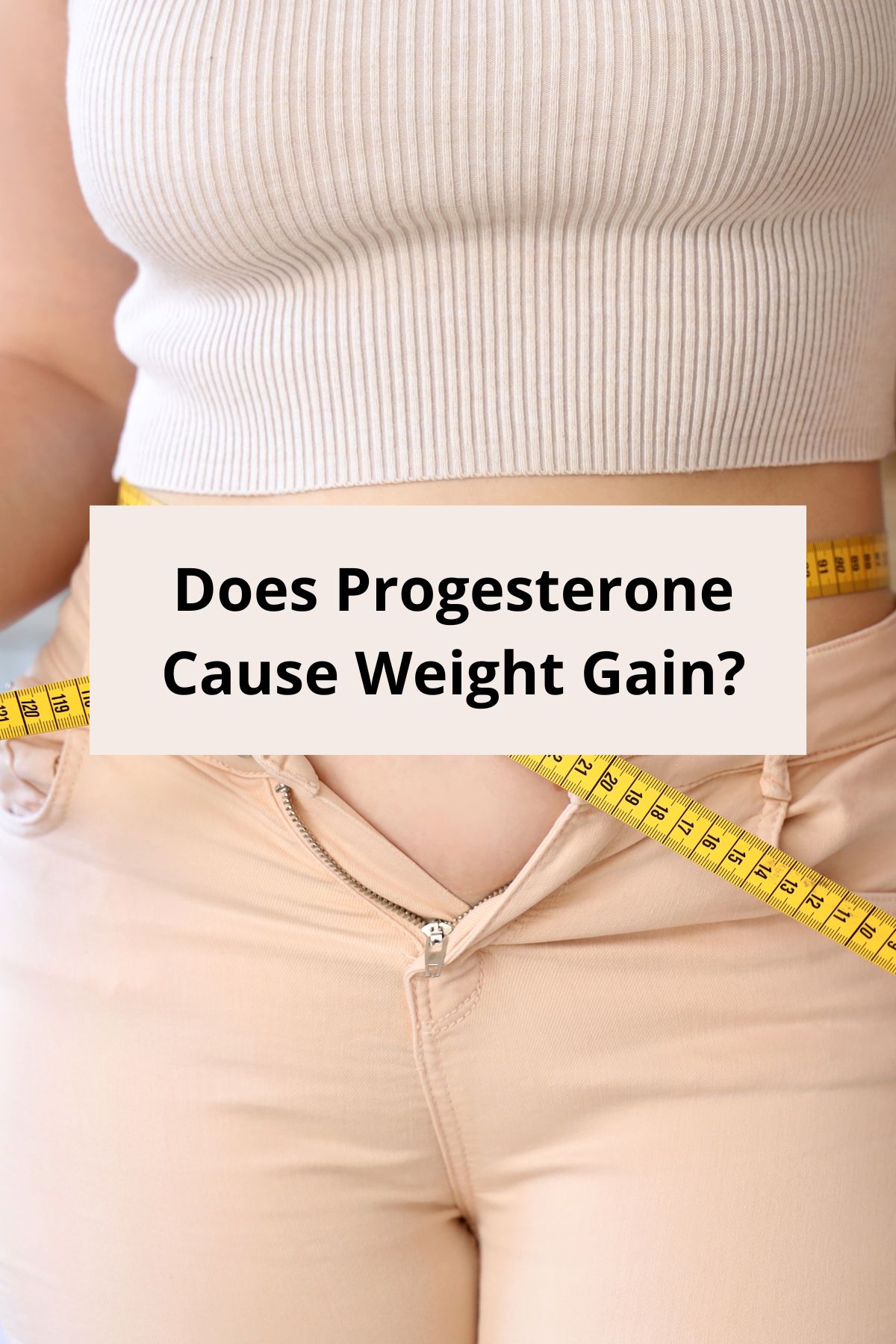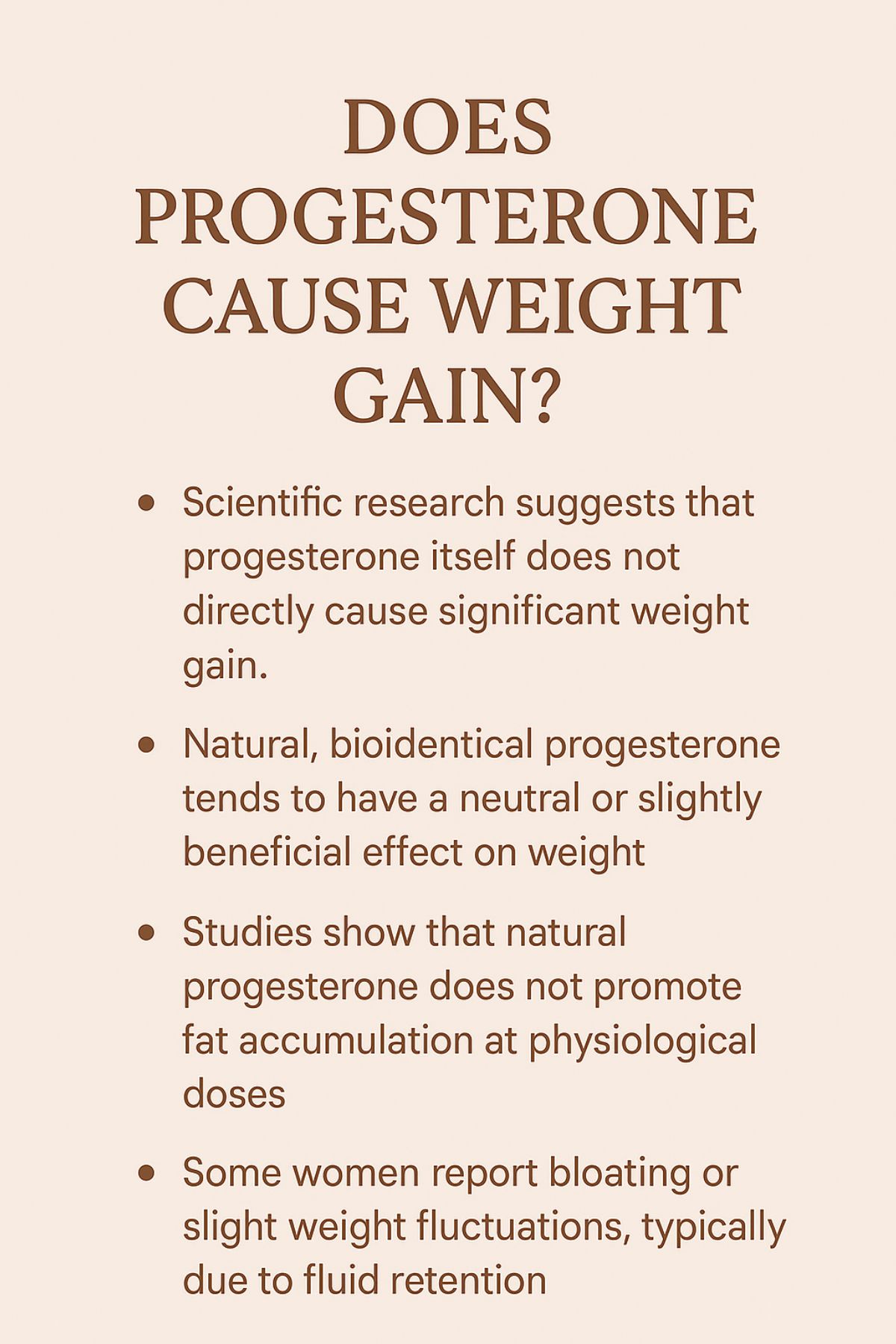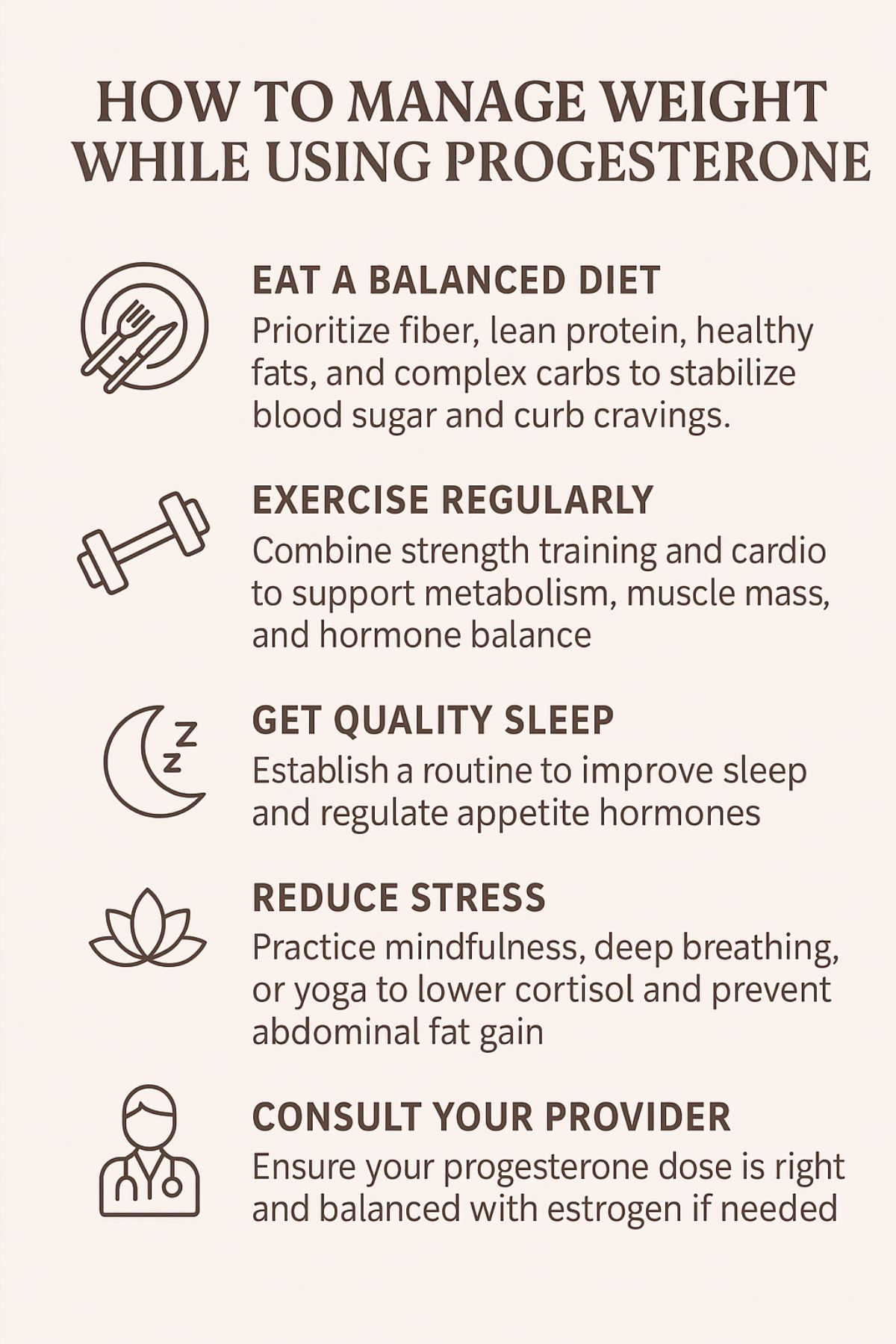When it comes to hormonal changes, many women find themselves asking, “does progesterone cause weight gain?” This question often arises during periods of hormonal fluctuation, such as pregnancy, perimenopause, or while undergoing hormone therapy. Progesterone, a vital hormone in the female body, plays essential roles in regulating the menstrual cycle, supporting pregnancy, and maintaining overall hormonal balance. However, its relationship to weight changes is often misunderstood. In this article, we’ll explore the facts behind progesterone and weight gain, separating myths from scientific evidence to help you better understand your body.

What is Progesterone?
Progesterone is a naturally occurring hormone that plays a central role in women’s reproductive health. It is produced mainly in the ovaries after ovulation, but smaller amounts are also made by the adrenal glands and, during pregnancy, by the placenta. Progesterone helps regulate the menstrual cycle, prepare the uterine lining for pregnancy, and maintain early stages of pregnancy. Beyond its reproductive functions, progesterone also influences mood, sleep quality, brain health, and metabolic regulation.
Throughout a woman’s life, progesterone levels rise and fall cyclically. They peak after ovulation during the luteal phase of the menstrual cycle and drop sharply if pregnancy does not occur, leading to menstruation. As women approach menopause, progesterone production naturally declines, contributing to a range of symptoms including sleep disturbances, mood swings, weight fluctuations, and changes in body composition.
Understanding Weight Gain and Hormones
Hormones have a powerful impact on the body’s ability to regulate weight. They influence key processes such as metabolism, appetite, fat storage, insulin sensitivity, and water balance. When hormone levels shift — whether due to natural cycles, stress, medication, or aging — noticeable changes in weight or body composition can occur.
It’s important to distinguish between different types of “weight gain.” True fat gain involves an increase in body fat stores, typically resulting from a sustained caloric surplus. However, hormonal shifts can also cause fluid retention, bloating, insulin resistance, or changes in muscle mass, all of which may be perceived as weight gain on the scale but are not always linked to an actual increase in fat.
Progesterone, like other hormones, can subtly influence these processes, which is why understanding the full hormonal landscape is essential before attributing weight changes to a single hormone.
Does Progesterone Cause Weight Gain?
Scientific research suggests that progesterone itself does not directly cause significant weight gain. Natural, bioidentical progesterone — the type produced by the body or used in bioidentical hormone therapy — tends to have a neutral or even slightly beneficial effect on weight regulation when properly balanced with estrogen. Studies show that natural progesterone does not significantly alter body fat distribution or promote fat accumulation when administered at physiological doses.

However, the story becomes more complex with synthetic progestins. Unlike natural (bioidentical) progesterone, which matches the structure of the hormone your body produces, synthetic progestins (such as medroxyprogesterone acetate or norethindrone) differ chemically and can bind to other steroid receptors — including those for androgens and glucocorticoids. This off-target receptor activity may explain why some women experience increased appetite, fluid retention, or fat redistribution when using synthetic progestins.
Even with natural progesterone, some women report feelings of bloating or slight weight fluctuations, but these changes are usually temporary and due to fluid retention rather than an increase in fat mass.
Situations Where Progesterone Might Seem to Cause Weight Gain
While progesterone itself does not inherently cause fat gain, there are situations where it can appear to do so:
1. Water Retention and Bloating
Progesterone can influence the body’s sodium-water balance. In some women, higher progesterone levels promote fluid retention, particularly during the luteal phase of the menstrual cycle or early hormone therapy. This water weight can cause puffiness, especially around the abdomen, hands, and feet.
2. Changes in Appetite
Although less potent than cortisol or estrogen, progesterone may subtly stimulate appetite in some individuals. Cravings — particularly for carbohydrate-rich foods — can lead to a temporary increase in caloric intake if not consciously managed.
3. Hormonal Imbalances
Hormonal imbalances — particularly an excess of estrogen relative to progesterone, sometimes called estrogen dominance — can lead to fluid retention, fat accumulation, and changes in body shape. Estrogen also promotes fat storage, especially in the hips, thighs, and abdomen, highlighting the importance of balanced hormone levels for healthy metabolism.
4. Progesterone Therapy Factors
- Dosage: Higher-than-physiological doses may influence appetite or water retention more than low-dose regimens.
- Form of Delivery: Oral progesterone metabolizes differently compared to creams or vaginal applications, potentially affecting side effects.
- Timing: Hormonal therapy initiated during life phases like perimenopause, when metabolism is already slowing, can make weight regulation more challenging.
Progesterone, Menopause, and Weight Changes
As women transition through perimenopause and menopause, natural progesterone levels decline significantly. This decline is part of a broader hormonal shift that also includes falling estrogen levels, slowing metabolism, and increased central fat storage.
Beyond metabolism, insulin resistance often becomes more pronounced during menopause. This means the body becomes less efficient at processing blood sugar, encouraging fat storage, especially around the abdomen. Changes in progesterone and estrogen both influence insulin sensitivity, and when combined with lifestyle changes (like decreased activity levels), they can contribute to stubborn weight gain.
Sleep disturbances and increased stress responses — both common when progesterone drops — also raise cortisol levels, which further promotes fat accumulation. Thus, the weight gain often associated with menopause is the result of multiple overlapping factors, not progesterone alone.
How to Manage Weight While Using Progesterone
If you are using progesterone therapy — or experiencing natural hormonal shifts — managing weight requires a holistic approach:

1. Balanced, Nutrient-Dense Diet
Focus on whole foods rich in fiber, antioxidants, lean protein, and healthy fats to stabilize blood sugar and hormone levels.
2. Stay Active
Strength training and aerobic exercise help maintain muscle mass, boost metabolism, and improve insulin sensitivity.
3. Prioritize Sleep
Aim for consistent, high-quality sleep to regulate appetite hormones (ghrelin and leptin) and support cortisol balance.
4. Manage Stress
Chronic stress can exacerbate hormonal imbalances and promote belly fat. Incorporating mindfulness, relaxation techniques, and self-care can be protective.
5. Support Gut Health
A growing body of research shows that gut microbiota influence estrogen and progesterone metabolism. A diet high in prebiotics (fiber) and fermented foods can support a healthy gut and promote better hormone regulation.
6. Work with a Healthcare Provider
Partner with a knowledgeable practitioner to optimize hormone therapy, assess for estrogen dominance, and tailor your plan based on your body’s needs.
Does Progesterone Cause Weight Gain: Key Takeaways
- Natural progesterone is unlikely to cause significant fat gain.
- Synthetic progestins may have different effects due to structural differences and off-target receptor binding.
- Estrogen and progesterone balance is critical for healthy metabolism and fluid regulation.
- Insulin resistance during hormonal transitions can contribute to weight gain.
- Gut health and hormonal regulation are interconnected and may influence weight.
- Lifestyle factors — nutrition, exercise, sleep, and stress — are crucial for weight management during hormonal changes.
Understanding the broader hormonal and metabolic picture empowers women to navigate midlife health challenges with greater confidence and clarity.
Conclusion
The question “does progesterone cause weight gain” reflects a common concern for women at various life stages. However, natural progesterone alone rarely causes meaningful fat gain. Factors such as water retention, estrogen dominance, insulin resistance, and lifestyle changes are often at the root of perceived or real weight changes.
By focusing on balanced hormone therapy, healthy nutrition, regular exercise, stress management, sleep quality, and gut health, women can maintain or improve their weight and overall well-being during periods of hormonal change.
Working with a knowledgeable healthcare provider can ensure your treatment plan supports both your hormonal balance and your long-term health goals.
FAQs
1. Can progesterone cream cause weight gain?
Progesterone cream typically results in minimal systemic absorption compared to oral forms. Significant fat gain is rare; bloating or fluid retention is more commonly reported and usually temporary.
2. How long does progesterone bloating last?
Bloating related to progesterone usually occurs early in therapy or during the luteal phase of the menstrual cycle and often resolves within a few days to a week.
3. Does natural progesterone vs synthetic progesterone make a difference?
Yes. Natural progesterone closely mimics the body’s hormone and has a lower risk of side effects. Synthetic progestins can interact with multiple hormone receptors, sometimes increasing appetite, fluid retention, or fat storage.
4. Can low progesterone cause weight gain?
Yes, low progesterone can contribute to weight gain indirectly. It may lead to estrogen dominance, poor sleep, elevated cortisol, and increased insulin resistance — all of which can make fat loss harder and promote abdominal fat storage.
5. Does progesterone in HRT cause weight gain?
When used in hormone replacement therapy (HRT), bioidentical progesterone does not typically cause weight gain when properly balanced with estrogen. Some women may experience temporary bloating or fluid retention, but studies show no consistent link to fat gain with well-managed HRT.
6. Will I lose weight after stopping progesterone?
If progesterone caused temporary water retention, stopping it may lead to mild weight loss as your body rebalances. However, if weight gain was related to other factors (e.g., metabolism, lifestyle), stopping progesterone alone is unlikely to result in significant weight loss.
